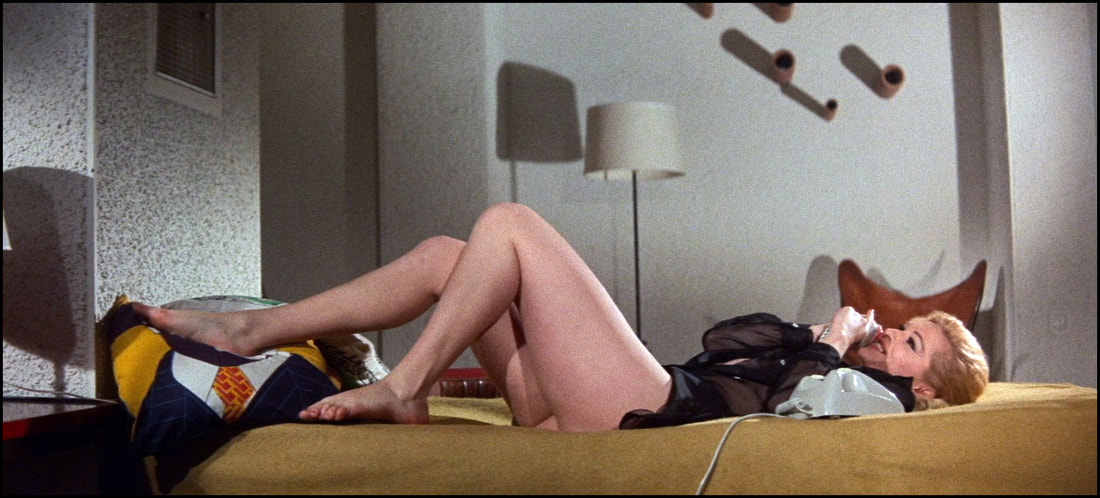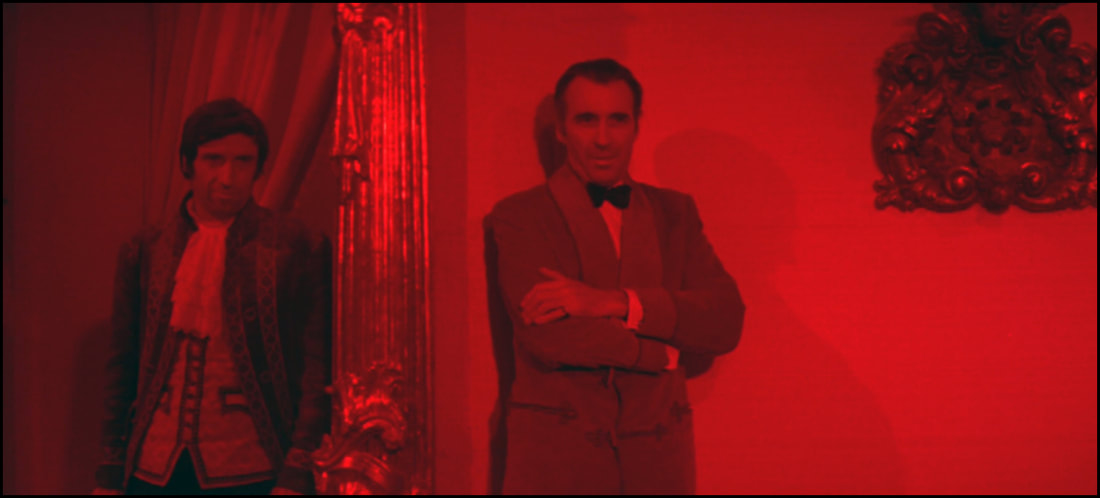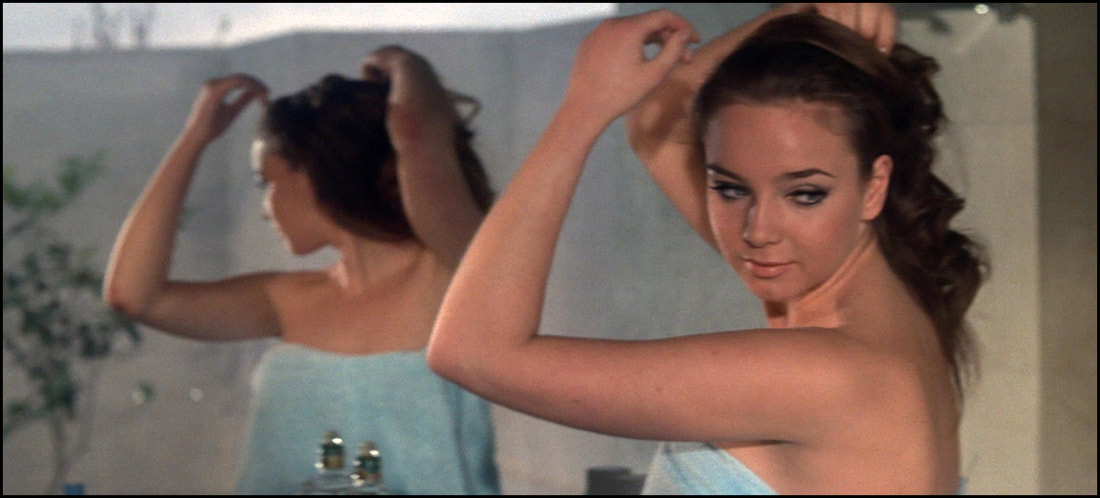Folks, a few months back I was contacted by one my distributor friends who recommended a few titles for me to consider for reviews. These were films from the wider library of Jess Franco, a storyteller from a bygone era who even today – a decade after his passing – remains somewhat controversial for a good number of reasons. The titles were Marquis de Sade’s Justine (1969) and Marquis de Sade’s Philosophy In The Boudoir (aka Eugenie) (1970). Because I watched them back-to-back (snicker snicker, given the subject matter), I’ve chosen to craft a blanket opening statement for their respective reviews, and I’ll then discuss their individual merits after my usual disclaimer. Thanks for reading!
If you write 183 different films, then the odds are pretty good that you’re going to have some winners and some losers in there, right? I mean … even if we’re really only talking statistically – with all that we’ve been told about a thousand monkeys typing endlessly, and one will eventually, inevitably produce something Shakespearean – then doesn’t it stand to reason that the screenwriter should find some successes and failures … right?
Now, let’s add another later:
If you direct an astonishing 207 different films, then the odds are pretty that – just like I stated above – you’re going to have the same? Some good, some bad, some ugly. I mean … it just stands to reason that would be the case … right?
Well …
I haven’t seen nearly as much from the library of works of Jess Franco (aka Jesus Franco) as have others. If I’m being perfectly honest, then I’d have to admit that friends and associates have largely encouraged me to avoid some specific titles – not his entire body of “art” – and I’ve never had cause to doubt the advice. I can say that what I have seen hasn’t been all that … erm … what’s the word? Impressive? Persuasive? Relatable? When it comes to productions, I do tend to identify more with films featuring characters I can relate to, and Franco allegedly trafficked in an awful lot of exploitation stuff. And, hey, I’ve no problem with that … but again I keep coming back to the lack of a logically progressing plot being a central requirement.
On that front, I think Franco probably swung and missed more than most, but he probably has a solid reputation wherein his misses might just make for a reasonable way to be entertained for an hour or two. These aren’t grand films by any estimation – at least, none that I’ve seen – but there’s still something about them that I just can’t quite put my finger on …
From the film’s IMDB.com page citation:
“An innocent girl goes to spend the weekend on an island with a woman and her brother, but soon finds herself entangled in a web of sexual experiments.”
I think it’s safe to argue that some films are much more ‘atmosphere’ than they are story, and – for what it’s worth – I think Philosophy In The Boudoir falls smack in the middle of that idea.
The vast majority of the action for this somewhat sexual perversion takes place on an island escape; cut of from the wider world-at-large, it’s an almost idyllic yet reasonably modern paradise, one that also houses (somewhere in its midst) a cult committed to exploring the limits of – ahem – their own definition of sexual depravity. It’s all captured by Franco and his crew with trickery big and small – some curious out-of-focus photography alongside some equally mysterious color schemes. While that sounds like it might be a bit more ‘skin flick’ than it is a serious arthouse project, there’s still fairly little in here that by today’s standards would be deemed controversial. In fact, comparing it to some of what gets released these days, this Boudoir is far more PG than it is anything else. But for its time? I guess this was pretty newsworthy.
Structurally, Boudoir reminded me quite a bit of Dangerous Liaisons (1988) starring Michelle Pfeiffer, Glenn Close, and John Malkovich; and it’s pretty easy to understand why. Mirvel (played by Jack Taylor) collaborates with his cunning sister Marianne (Maria Rohm) to lure the young, impressionable, yet voluptuous Eugenie (Marie Liljedahl) to this isolated spot so that he can – finally – have his way with her. But somewhere along this passionate journey Marianne hints at exploring her own pleasures (to a degree) with the lass, and then the barn doors are swung wide open when Dolmance (Christopher Lee) and his cult of bedroom adventure seekers begin their own quest for satisfaction as well. Added to this is Franco’s attempts to blur the lines between fantasy and reality, putting the viewer in the precarious position of trying – like Eugenie – to figure out what’s real and what isn’t.
The big difference between Boudoir and Liaisons, however, might be with how it leaves its characters in the last reel. For example, Marquise Isabelle de Merteuil (Glenn Close) ends up unintentionally delivering her own fall from grace within French society once she’s been fully exposed as the tale’s true villainess. Her evil machinations have cost even human lives, and for what? All at the expense of proving herself more diabolically clever than her various suitors and paramours? But Boudoir employs a curious circularity: Franco’s film begins exactly where it began, and – depending upon one’s interpretation – one might suspect that the real person violated here was the audience. Did all of this happen? Was it just one woman’s fanciful imagination? Could it all have been just a dream … after all? That may have been the only way to make sense of every dangled red herring met along the way!
Marquis de Sade’s Philosophy In The Boudoir (aka Eugenie) (1970) was produced by Etablissement Sargon, Hape-Film Company GmbH, Producciones Cinematograficas Balcazar, and Video-Tel International Productions. DVD distribution (for this particular release) is being coordinated by the good folks at Blue Underground. As for the technical specifications? Though I’m no trained video expert, I found the sights and sounds of this reported 4K restoration (from the original camera negative) to be quite good, but be warned: there are a few sequences within that are mildly out-of-focus. (I’ve learned from both reading and the supplied commentary that these were done deliberately with artistic intent. You can make up your own mind about whether or not that was a good idea, but I don’t think it was.)
Finally, if you’re looking for special features, then here’s what you have waiting for you. The 4K disc includes only the film along with the commentary by film historians Nathaniel Thompson and Troy Howarth; while I don’t like ‘dissing’ on commentaries, I’ve always got to be honest. I’ve heard Thompson on several projects, and – unfortunately – he’s just too hard to listen to because he talks far too fast. In fact, he speaks so quickly it’s often extraordinarily difficult to get out what he’s saying about fifty percent of the time. (Yes, that may be my age showing, but – as I said – I gotta be honest.) The Blu-ray disc also includes the commentary along with a few additional interviews, most of which look at the totality of Franco’s career with only smaller observations on this particular title. There are also some stills and posters for you to consider. It’s a good collection, to be fair … I just wish someone would tell Thompson to slow it down.
Recommended, but …
As I mentioned above, I had the opportunity to view two Franco pictures, and – by far – Philosophy In The Boudoir I found the better of them if for no other reason that there was a stronger story and perhaps even better defined characters. While it still wasn’t a fulfilling experience – bizarre camera trickery here and there and an unwillingness to spell out exactly everything that was going on in here – I’d still suggest going into it knowing in advance that Franco’s storytelling tropes might not be to everyone’s liking. There’s good and there’s bad – having Christopher Lee turn up in what might be the most curious cameo-style role in the man’s filmography – and you just might be left wanted more.
In the interests of fairness, I’m pleased to disclose that the fine folks at Blue Underground provided me with a complimentary 4K UltraHD of Marquis de Sade’s Philosophy In The Boudoir by request for the expressed purposes of completing this review; and their contribution to me in no way, shape, or form influenced my opinion of it.
-- EZ




 RSS Feed
RSS Feed